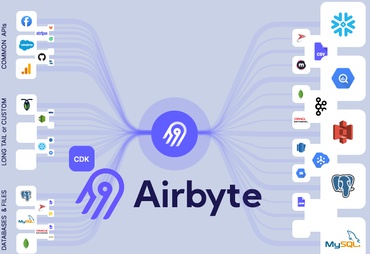Why become a data engineer?
Looking around the world, We must know that data is growing constantly and rapidly and that is why it is becoming most important for organizations to cater with huge data to know the analytics and visualization to drive their businesses efficiently. In older days, it was quite easy to write python or R scripts on top of data or databases for such visualization dashboards. But nowadays the biggest challenge and the most critical part is how to efficiently process and store this much huge data. That is where the Data Engineer’s job comes into the picture. Also, this field is the most rewarding and challenging. Below are the steps to start the journey to becoming a Data Engineer.
What do data engineers do?
Engineers design and build things. Make sure you understand the difference between a Data Scientist and Data Engineer. Data Scientists are responsible for building models using mathematics, statistics and machine learning to predict complex behavior in real-world software. Whereas Data Engineers are responsible for creating data pipelines for processing and modelling data in a way that is easier to understand and analyze.
Data Engineers get attractive packages as well.
Become an expert in programming languages
The first and foremost step is to become an expert on the programming languages like Java, Scala, Python, R, Go, Ruby etc. If you want to be a Data Engineer, you will have to be a software engineer. You should be able to write the right algorithm for your job. You should be able to write clean code along with the test cases to test your code to make sure things are not breaking. Practice the TDD (Test Driven Development ) approach and various design patterns you can use in your coding. Java is a widely used bytecode programming language that is faster and runs on a Java Virtual machine (JVM). Scala is the most efficient programming language and you will be able to write concise code in it. Scala runs on JVM just like Java, so you will be able to use Java libraries also.
Same way Python and R are scripting languages. Python does have a rich set of libraries available for data visualization as well as for machine learning.
Automation And Scripting
Automation and scripting are also necessary as it helps you automate repetitive tasks like data downloading from customer SFTP locations etc. You will need automation in data collection, data sanitization, data cleaning, data integration and data warehousing.
Learn data processing frameworks and tools
Data processing frameworks are equally important along with Programming language. They offer the facility to process huge data in parallel. Hence they facilitate parallel programming and processing of data. Data processing can be done in two ways, in batch or stream.
Apache Spark is one of the best frameworks for parallel data processing. It has a provision of APIs in many programming languages including Java, Scala, Python etc. Spark does in-memory computations on the data which give speediness to your application. Spark is a unified engine that will give you the capabilities of querying data in SQL programming language as well it has machine learning and graph processing algorithms as well. Apache spark is 100 times faster than older Hadoop maps reduce data processing techniques.
Learn the difference between batch processing and stream processing of the data, and know when to use which one.
Learn the ETL(Extract Transform and Load) tools. ETL tools help you write data pipelines end to end. Talend, Pentaho are some of the tools for ETL pipelines.
Learn Kafka the messaging system, Hadoop HDFS(Distributed File System), HBase, Hive various Hadoop ecosystem components.
Understand various databases
Once you process your data, you would have cleaner, aggregated data to store in the database from where you will be visualizing your data on the dashboards. Be careful selecting databases for your systems as it plays an important role in query performance. Understand the RDBMS, OLAP, NoSQL databases. Learn to use row-oriented or column-oriented databases as per the requirement. In the case of Data engineering, OLAP databases like Clickhouse, Apache Druid perform very well in terms of data ingestion and data querying as they are columnar databases. There are many other databases available for big data such as Cassandra, BigTable, Pinot, Redis, MongoDB, CockroachDB etc. Based on your use case scenario, you would be able to use the database. Learn the pros and cons of each of them by doing spikes around them.
Study cloud computing
Nowadays, people are using on-demand servers and resources to cater for fluctuating data traffic. The organizations like banks or hospitals do have different kinds of data traffic during the day and night.
Currently, various cloud provisioners are Microsoft Azure, Amazon Web Services (AWS) or Google Cloud Platform (GCP).
It is inevident to learn about cloud computing and its services. You can learn about various cloud Services available for Computation, Storage, Operations, Databases are available. Various storage options on the cloud are S3, EBS, EFS etc. Computation resources like EC2 are available. AWS Redshift, AWS DynamoDB, Azure SQL data warehouse are the database services provided.
You must go for the cloud certifications as it helps to improve your career path and it is always an advantage to the Data engineer to possess a cloud certification. Getting professional certificates increases your chance to get a dream job in the data engineering field.
Learn the deployment tools
Once you pass through all and design your application, it is now time to deploy them.
It will be of great use if you master Docker, Kubernetes and Helm.
Docker is an open-source Containerisation tool that makes your application platform agnostic. It becomes so easy to build, deploy and manage with docker.
Kubernetes provides the orchestration of Docker containers. It provides you automated rollback-rollouts, auto-scaling, self-healing capabilities along with the smooth deployment of the containers.
You may use Kubernetes to set up a spark cluster or database cluster as it provides various managed services which reduce our efforts for deployment.
Helm is a package manager for Kubernetes. It helps developers as well as operators to more easily package, configure and deploy the services or applications.
Get familiar with the different operating systems
As data engineers are responsible for creating data pipelines and deploying them to production environments, it is important to have hands-on experience on widely used operating systems like Ubuntu, Linux, Unix etc.
Endnotes
That is it, you are at the end of the trip to become a data engineer. Becoming a data engineer is not so easy as it requires a deep understanding of tools and techniques. Always make yourself aware of new tools and frameworks available in the market as the market keeps on changing rapidly. Start leaping in the field and gradually you will be there at your desired destination. With all of the above skills in your resume, you will have a chance to land a job as a Data Engineer.


